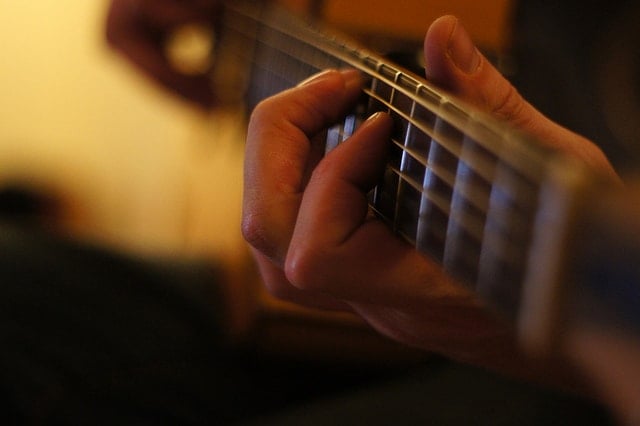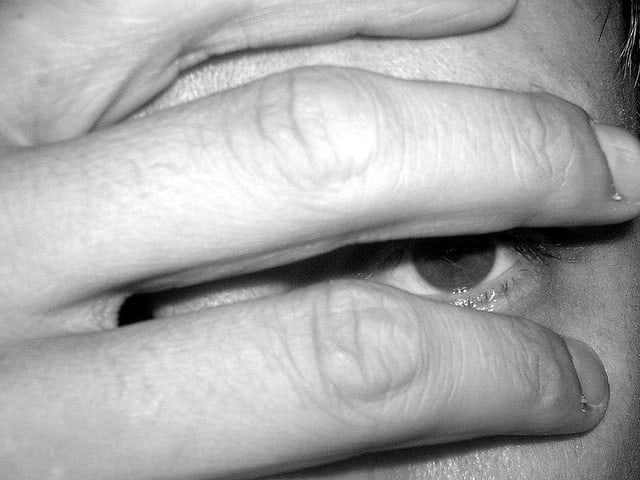Oh no. My eyes dropped to the floor as my Jesuit brother lifted the strap over his head and gripped the fretboard of his acoustic guitar, clamping his capo into place. “I wrote this song over 30 years ago,” he began. Oh, don’t do this, I thought. This isn’t going to go well. I shifted uncomfortably in my chair and held my breath, eyes still downcast as he began to strum and sing an original setting of the parable of the Good Samaritan. Tell me when it’s over.
Last month I was on a retreat with a couple dozen students and several chaplains. Ostensibly a silent one for the students, there were talks or conferences several times a day, where staff members would give input, lead a prayer or meditation, or offer some encouraging words about the various movements of Ignatius’ Spiritual Exercises.
The format of these talks is left up to the chaplains and we’re encouraged to be creative. I’ve used video clips from The West Wing to suggest various images of God, text from Bernstein’s Kaddish Symphony to talk about honesty in prayer in the best tradition of the psalms, and a clip from the film “Happythankyoumoreplease” to illustrate gratitude. These talks have been well-received, and so I have a sense of what ‘works,’ of what students respond to and get something from.
Acoustic singing a la the late 1970s is not on my list of effective strategies. It feels dated. It has the potential to be hopelessly hokey. It’s bad.
It’s a good thing my internal monologue stays that way.
***
I think that monologue is the product of my brash and often critical New York-upbringing, in which I grew up with a default mode: critique. I wouldn’t do that. I wouldn’t say it that way. I would have done that differently. It’s hard to recognize this in myself, and ultimately, hard to turn it off, to switch from biting critic to carefree participant, or, even harder, to supportive partner.
There’s something about my internal monologue that insists on the ideal, on the perfect, that refuses to settle or yield. In the past I have convinced myself that I just have high standards and the world (and others) just never lives up to them. I’m just not easily impressed, I’ve told myself, as if that were a virtue, as if I knew better.
But when I lifted my eyes for a moment while my Jesuit brother strummed his guitar and sang earnestly, I could see that the students were moved. They listened carefully to his words and watched him intently as he shared his songs, the product of his prayer and the circumstances of his life. The authentic presentation of his experience was well received, which shouldn’t have surprised me, but did.
***
The truth is that assuming a posture of critique and insisting on the ideal (whatever that is) means I often miss out on the opportunities to encounter the authentic. Too often I’m dismissing what is for what’s hoped for or what I think is best. To strive for excellence is not a bad thing in and of itself, of course, but when it becomes a central focus or driving force at the expense of encounter, it’s a clarion call for change.
I want to insist on the ideal – my own sense of what is right or correct – but authenticity is more important. Only in authenticity can real relationship be found and formed. To insist on the ideal is to construct a perpetual wall, a moving goalpost, a suffocating set of limits. Authenticity may always be imperfect and incomplete, but it will always at least be. The ideal exists only in my mind, just out of reach and is always tantalizingly disappointing.
***
Those days of retreat are, for me, tangible moments of confirmation: in my prayer life, in my relationship with God, in my Jesuit vocation. I get to see, up close and personal, what God is doing in the lives of other people: the increasing and wonderful possibilities for God. In those days, my work with students on retreat gave me the courage to ask for something more from God: for the opportunity to behold and embrace authenticity, the wonderfully incomplete and imperfect reality of the other.
– // –



